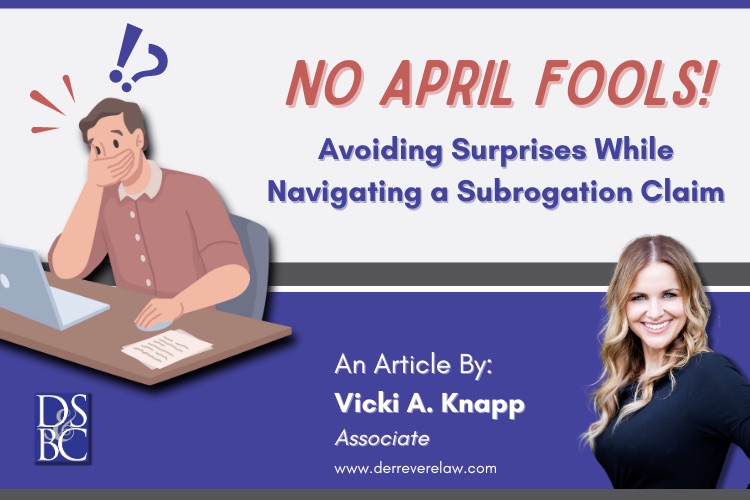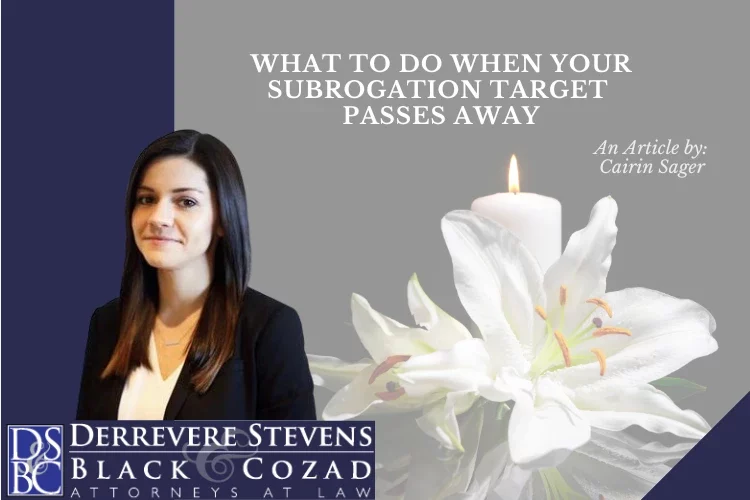April 1, 2024
No April Fools! Avoiding Surprises While Navigating a Subrogation Claim
April Fools’ Day has us all on the lookout for pranks, however it is never fun to be surprised when managing a subrogation claim. While there are endless pitfalls that could be waiting behind every door, there are some surprises for which you can be on the look-out. Here are a few potential issues to watch out for so that your new subrogation file is no laughing matter.
1. Surprise! There is a subrogation waiver.
You may have all the facts you need in your claim to prove negligence, but a great case complicated by a potential subrogation waiver, should not be left to be discovered and tripped over at the last minute. The first document to check is always the policy, which sometimes can contain waiver language. Other applicable contracts, such as bylaws, leases, sales orders, or even a target’s terms of service or warranties included with their products, could contain this wording.
2. Gotcha! The insured surprises you.
It is important to attempt to establish communication with the insured soon after you receive your claim so whatever assistance, or lack thereof, they provide, does not leave you blindsided. You may only need to obtain a few additional details, or alternatively you may require the insured’s more in-depth involvement, such as requesting their participation in a property inspection or needing them to sign a statement to support the claim. But, whatever the level of assistance, it is better to know if and how the insured will cooperate as early as possible. For instance, finding out from your insured that they do not wish to participate in future litigation is a revelation that could guide your claim management and that should not catch you unaware.
3.Watch Out! Stumbling through changing state laws.
The state law where your loss occurred can have major implications in how you manage your subrogation claim. For negligence claims, in particular, the insured’s level of liability could be the difference in your claim receiving a full, reduced or even zero recovery. You do not want to fall for believing you can recover from a carrier just because they admitted their insured was equally at-fault, only to discover too late that the loss occurred in a state that just adopted a 50% modified comparative negligence rule. For example, Florida recently switched to this from its former pure comparative negligence standard. Therefore, whereas before you could recover on a subrogation claim even if the insured was 99% liable, now your claim would be worthless if the insured is found to be more than 50% responsible. Keeping up to date with the applicable state law will ensure you do not end up feeling foolish.
4. Beware! The statute of limitations.
There could be no greater and unwanted surprise to a lawyer managing a subrogation claim than missing the deadline for your statute of limitations. As described above, ever-changing state laws require extra vigilance in monitoring your claim’s statutes. As an example, another aspect of Florida’s sweeping tort reform bill was the statute of limitations for negligence claims being reduced from 4 years to 2 years. Identifying early on what type of claim you have based on your facts can positively affect your strategy. For instance, product defect statutes can differ significantly in length from negligence statutes. So, if the question is whether the insured’s leaky refrigerator was due to faulty installation or a manufacturer’s defect, it is better to have the only possible surprise be that you have more time to file a lawsuit, rather than that time has elapsed.
5. A Surprise Party! Places in your claim where “the unexpected” may hide.
Out-of-pocket expenses: One surprise you may not have anticipated is that the insured has out-of-pocket expenses or that the carrier issued payments for which you were unaware. It is important to contact the client before you settle a claim to makes sure you have the complete and final adjusted amount of your claim;
Background checks: Performing a background check on your target, particularly before deciding whether to proceed with pursuit of the target, is essential to prevent looking foolish. Your target may have a lot of assets or may be penniless. They may have even passed away. Do not let this news come as a surprise to you after significant litigation expenses have already been incurred;
Missing potential adverse parties or carriers: There may be other targets to pursue than the initial adverse parties presented to you by the client. It is important to look behind every door to explore all avenues and exhaust your options in who you can pursue for the damages. Information on additional parties can be obtained from the insured or gathered from documents such as police reports, FOIA requests, underlying lawsuits, or even news reports related to the loss;
Releases: A release provided by a carrier might contain indemnity language or list unrelated, incomplete or inaccurate parties and claim information. Or it may include personal injury language when it is a property damage claim. Perhaps a party has already signed a release and you did not know about it. While there may always be an unknown component to your claim, performing your due diligence in evaluating the release language alongside conducting a thorough investigation, will aid in limiting the surprises.
Experts: Your expert may give you advice on the merit of your target’s theory of liability and can similarly guide you on how far you can take the claim. However, it is important to make sure that the expert upon which you are relying is qualified to testify in court on the matter. Additionally, if your expert, insured or even client failed to preserve the evidence for your claim, you could be surprised to find that your expert’s opinion may be rendered inadmissible.
Ultimately, your role as a subrogation professional will lead you to encounter endless pitfalls in April and throughout the year. However, staying alert to avoid some of these more common issues while navigating a new subrogation claim can help to prevent you from feeling foolish when surprises do pop up.
October 23, 2023
A Guide to Subrogation Pre-Suit Demand Packages
Purpose
A pre-suit demand package puts the tortfeasor and/or their carrier on notice of a subrogation claim. It serves as the first formal step in the process for an insurance carrier to inform the at-fault party of the claim and offers an opportunity to settle the claim without litigation. Moreover, it signifies the carrier’s readiness to proceed with litigation if there is no response to the demand or if the claim does not resolve.
Contents
The contents of a pre-suit demand package usually include a pre-suit demand letter and an accompanying damage package. Let’s take a look at each component in more detail.
-
- “Notice of Claim,” “Demand,” or “Pre-Suit” letter should include the following information:
- Preliminary information: date of loss, loss location, claim number, insured’s name and insurer’s name.
- If the demand letter is addressed to the tortfeasor’s carrier, include the tortfeasor’s name and
their claim number and/or policy number so the adverse carrier can review the claim more
efficiently.
- If the demand letter is addressed to the tortfeasor’s carrier, include the tortfeasor’s name and
- Basis to pursue the at-fault party: Important identifying facts surrounding the loss and reasoning for
pursuing the tortfeasor. Some examples include:- Automobile incident: Be sure to include the vehicle year, make, model and VIN so there is no
confusion that the tortfeasor owned and/or operated the vehicle that caused the damage to your
insured’s vehicle and/or property. - Product liability: Be sure to include identifying information about the product that is
defective, for example, the model and serial number of the product.
- Automobile incident: Be sure to include the vehicle year, make, model and VIN so there is no
- Amount of damages that are being sought: this should include the deductible that is being pursued on
behalf of the client insurance carrier. - Prejudgment interest – if you do not ask, you do not get!
- Look into whether the subrogating insurer is entitled to prejudgment interest in the state where
the loss occurred. If the insurance carrier is entitled to prejudgment interest in the specific
jurisdiction where the loss occurred, this, at the very least, provides a higher starting number
when discussing settlement negotiations. At the most, the insurance carrier may recover more
than they paid out, which makes for a very happy subrogating insurance carrier!
- Look into whether the subrogating insurer is entitled to prejudgment interest in the state where
- Deadline for a response: Usually a pre-suit demand package provides a thirty-day deadline to respond and
highlights that if no response is received within that time frame, litigation will be initiated. This
puts pressure on the tortfeasor and/or their carrier to investigate the claim immediately and to timely
respond to the demand. - Specific requests or notifications of examinations may be included in the demand letter.
- A demand for preservation of evidence can be included in the initial demand package if the
tortfeasor is in possession of any crucial evidence that may be the subject of potential
litigation. - A notification of a site examination, joint destructive examination, or removal of the evidence
may also be presented in the initial demand letter. This allows the claim to move faster without
the need to wait for the deadline for the initial demand letter to lapse.
- A demand for preservation of evidence can be included in the initial demand package if the
- Delivery of demand letter: Another consideration when sending out a demand letter is proof of delivery,
such as sending out the letter via certified mail or requesting a delivery/read receipt if the letter is
sent out via e-mail. This is particularly helpful when the demand letter is a “condition precedent” to
filing suit and when the case is up against an approaching statute of limitations deadline and to avoid
any dispute that the demand letter was delivered and received.
- Preliminary information: date of loss, loss location, claim number, insured’s name and insurer’s name.
- “Notice of Claim,” “Demand,” or “Pre-Suit” letter should include the following information:
- Damage Package: A damage package should at minimum include proof of payment/copies of check and supporting
documentation for each payment made.- Proof of payments made by the insurance carrier;
- Supporting documentation for each of the payments made;
- Photographs of the damage;
- Police report/fire report (if favorable);
- Expert report (if favorable);
- Any other documentation that could help support your subrogation case, for instance, a repair receipt
showing the negligent work performed by the tortfeasor.
Review State Requirements for Pre-Suit Demand Packages
The specific requirements for a pre-suit demand package can vary depending on the jurisdiction and the specific circumstances of the case, so it is crucial to review state law prior to sending out a demand letter.
Some states allow a request for insurance information from the tortfeasor. For instance, Florida Statutes, Section 627.4137, requires the disclosure of the following information within 30 days of the written request:
- The name of the insurer.
- The name of each insured.
- The limits of the liability coverage.
- A statement of any policy or coverage defense which such insurer reasonably believes is available to such insurer at the time of filing such statement.
- A copy of the policy.
This is useful to determine whether the client’s insured is an additional insured under the tortfeasor’s policy and establishing the tortfeasor’s policy limits.
Additionally, some states require a demand letter prior to filing suit depending on the type of loss. For instance, Georgia, Florida, and Idaho require a written notice of claim for a construction defect claim prior to commencing an action in litigation against a construction professional. It is therefore crucial that the pertinent state law is reviewed to determine how the notice of claim should be sent to the construction professional, the required contents for the notice of claim, and the deadlines associated with sending out and responding to a notice of claim.
It is also important to note that pre-suit requirements may vary depending on the tortfeasor you are pursuing. For instance, if you are pursuing a governmental entity there may be state specific requirements as to who you should send the notice of claim to and as to any notice deadlines.
Conclusion
A well-crafted pre-suit demand package can be a powerful tool in subrogation cases. It not only sets the stage for negotiations but can also expedite the settlement process and pave the way for a successful resolution in favor of your client.
September 11, 2023
A Look at Spoliation Remedies in Florida
Spoliation of evidence can make or break any case, regardless of how strong liability and damages may be. As a firm with an entire division dedicated to litigating subrogation matters, we have been on both ends of spoliation motions. This shall serve as a synopsis of how Florida handles spoliation in various scenarios.
July 3, 2023
Navigating the Delicate Relationship With an Insured During Subrogation
DSBC Associate Morgan Long explains how to navigate the unique relationship with the insured during the course of a subrogation claim.
June 20, 2023
Subrogation Theories When a Fire Originates From a Neighbor’s Residence in Florida
Florida allows subrogation recovery for damage due to the spread of fire from a neighboring property. Discover three strategies that can be employed when attempting to develop a theory of liability.
May 22, 2023
Raising Subro: Building Your Subrogation Dream Team
Achieving success in the subrogation field is largely dependent on the team of subrogation professionals and/or attorneys that you assemble. The two simple, yet critical elements to building your subrogation dream team are hiring the right people for the job and raising them to be stars of your team. Every employer has different criteria that they use to help determine the best employee to hire. Most will focus on pedigree and experience in the subrogation field. Employers feel more comfortable hiring an employee who has previously worked in subrogation as they feel they will most likely be easier to train and start producing results sooner. However, if you hire the right kind of employee and have an established training program for your subrogation team, prior subrogation experience is not necessarily a requirement.
The three essential traits of a great subrogation hire are someone who is trainable, has a compatible personality, and is a team player. Determining if a potential hire is trainable is key to their long-term success on your team. Whether it’s a 20-year seasoned veteran of the subrogation industry or a green adjuster/attorney that has no clue as to what subrogation means (outside of their quick Google search of the term in preparation for their interview), finding someone who has the willingness to learn is highly important. Teaching a new subrogation hire takes time and requires the new employee to have the patience to start from the basics and gradually learn the process. If the new hire is unwilling to learn your group’s subrogation process and listen to constructive criticism of their supervisors, then this can
substantially hurt the chances of the employee becoming an effective member of the team.
Hiring an employee with a compatible personality is one of the most important attributes but is probably the most difficult to attain. Your current team’s culture will determine which type of personality you are looking for. You want a new team member that will fit in with your current group and bring something new to the table. For example, our subrogation group at DSBC consists of a diverse set of personalities and people but the common theme is being a “good” person and team player. We spend so much time with our work family that you want to enjoy who you are spending your time with. This starts with people who prioritize respect. All members of the team are required to treat each other with respect. Whether senior management or a new intern, all teammates must respect one another. Here at DSBC, we also adhere to the work hard/play hard mentality. Hitting your recovery goals takes an immense amount of grinding and effort throughout the year. However, there is no reason why your team cannot have fun while working through the grind. Find team members that have enthusiasm, charisma, and are enjoyable to work with. If your new employee’s personality fits in with your team, then you are more likely to avoid unnecessary office drama and they will improve your team’s work environment.
The last essential trait for a new member of the team is being a team player. Hitting your subrogation recovery goals takes a village. Every member of your team needs to be invested in helping, however possible, to achieve your goals. Whenever an issue/challenge arises, all team members need to be ready and willing to assist. If team members are solely focused on their own recovery numbers, then it can hurt your team’s morale and your ability to achieve the group’s recovery goal. Being a good team player also involves checking your ego at the door and being willing to assist in any task whether it’s big or small. When selecting your new employee, focus on whether they are going to be a willing helper regardless of the task.
The last step to building your subrogation dream team is building an established training system to put your new hires in the best position to succeed. First and foremost, having supervisors and senior members of the group spend time with the new employees is essential to your training system. Your senior members of the team are your best assets in training your new teammates. This obviously requires your senior members to be willing to commit some of their work time to training but the eventual rewards are more than worth it. One of the best tools for training is observation. Trainees learn best when they can observe other members of the team while they are handling their daily duties. Whether its new attorneys shadowing senior attorneys in depositions, mediations, and hearings or subrogation professionals bringing new hires onto their phone calls to observe, this type of experience is essential in training your new employee and also showing them the culture of your group. Another key training tool is making all members of your team accessible to the new employees for questions. The different members of the team can pass on different lessons and strategies to help the new teammate build their own work routine. Making sure that you have an open-door policy for the new employees is extremely helpful in ensuring they feel comfortable enough to ask questions. Lastly, empowering your new employees is key to them becoming self-sufficient and effective members of your team. Constructive criticism is part of any good training system but building up your new employee’s confidence is important as well. When mistakes are made by a new employee, it is important to focus on finding a solution and using the experience as a teachable moment for them. When new team members accomplish tasks, make sure the senior members of the team take time to show praise as well. Instilling confidence in your new employees will help produce more competent and self-sufficient members of your team.
Building your dream subrogation team is a combination of finding the right teammates and providing them the proper training to succeed. While prior experience in the subrogation field is certainly helpful, it does not need to be a prerequisite to hiring a new member of your subrogation team. As long as you prioritize the compatible personality traits that fit your group in the hiring process and develop an effective training system, you can continue to grow and strengthen your subrogation team.
April 13, 2023
Additional Personal Injury Protection Subrogation: A Not So New Pair of Shoes
Many legal practitioners are familiar with the doctrine of subrogation while some may only recall from their Bar studies. You are invited to walk this article’s literary path, which traverses a lesser-known avenue of subrogation by way of Additional Personal Injury Protection (“APIP”) coverage.
March 6, 2023
What Is the Sutton Doctrine and How Does It Affect Subrogation?
Senior Associate Mary Grecz explains the Sutton Doctrine and how it affects subrogation.
January 23, 2023
What to Do When Your Subrogation Target Passes Away
Subrogation is the right of an insurance company to be repaid the money they spent on an injured policyholder while their personal injury claim was pending. Find out how to proceed when your subrogation target passes away.
November 21, 2022
Subrogation – It’s Not Just a Funny Word
Subrogation is a product of justice. DSBC attorney Jessica Mehaylo breaks down the word, its meaning, its origin, and most importantly, how it applies to you.










